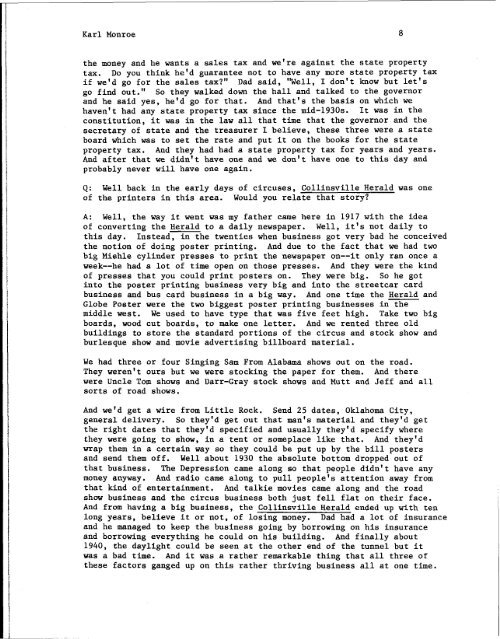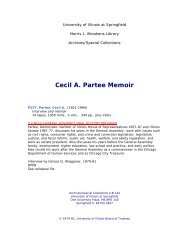Karl Monroe Memoir - University of Illinois Springfield
Karl Monroe Memoir - University of Illinois Springfield
Karl Monroe Memoir - University of Illinois Springfield
Create successful ePaper yourself
Turn your PDF publications into a flip-book with our unique Google optimized e-Paper software.
<strong>Karl</strong> <strong>Monroe</strong> 8<br />
the money and he wants a sales tax and we're against the state property<br />
tax. Do you think he'd guarantee not to have any more state property tax<br />
if we'd go for the sales tax?" Dad said, "Well, I don't know but let's<br />
go find out.'' So they walked down the hall and talked to the governor<br />
and he said yes, he'd go for that. And that's the basis on which we<br />
haven't had any state property tax since the mid-1930s. It was in the<br />
constitution, it was in the law all that time that the governor and the<br />
secretary <strong>of</strong> state and the treasurer I believe, these three were a state<br />
board which was to set the rate and put it on the books for the state<br />
property tax. And they had had a state property tax for years and years.<br />
And after that we didn't have one and we don't have one to this day and<br />
probably never will have one again.<br />
Q: Well back in the early days <strong>of</strong> circuses, Collinsville Herald was one<br />
<strong>of</strong> the printers in this area. Would you relate that story?<br />
A: Well, the way it went was my father came here in 1917 with the idea<br />
<strong>of</strong> converting the Herald to a daily newspaper. Well, it's not daily to<br />
this day. Instead, in the twenties when business got very bad he conceived<br />
the notion <strong>of</strong> doing poster printing. And due to the fact that we had two<br />
big Miehle cylinder presses to print the newspaper on--it only ran once a<br />
week--he had a lot <strong>of</strong> time open on those presses. And they were the kind<br />
<strong>of</strong> presses that you could print posters on. They were big. So he got<br />
into the poster printing business very big and into the streetcar card<br />
business and bus card business in a big way. And one time the Herald and<br />
Globe Poster were the two biggest poster printing businesses in the<br />
middle west. We used to have type that was five feet high. Take two big<br />
boards, wood cut boards, to make one letter. And we rented three old<br />
buildings to store the standard portions <strong>of</strong> the circus and stock show and<br />
burlesque show and movie advertising billboard material.<br />
We had three or four Singing Sam From Alabama shows out on the road.<br />
They weren't ours but we were stocking the paper for them. And there<br />
were Uncle Tom shows and Darr-Gray stock shows and Mutt and Jeff and all<br />
sorts <strong>of</strong> road shows.<br />
And we'd get a wire from Little Rock. Send 25 dates, Oklahoma City,<br />
general delivery. So they'd get out that man's material and they'd get<br />
the right dates that they'd specified and usually they'd specify where<br />
they were going to show, in a tent or someplace like that. And they'd<br />
wrap them in a certain way so they could be put up by the bill posters<br />
and send them <strong>of</strong>f. Well about 1930 the absolute bottom dropped out <strong>of</strong><br />
that business. The Depression came along so that people didn't have any<br />
money anyway. And radio came along to pull people's attention away from<br />
that kind <strong>of</strong> entertainment, And talkie movies came along and the road<br />
show business and the circus business both just fell flat on their face.<br />
And from having a big business, the Collinsville Herald ended up with ten<br />
long years, believe it or not, <strong>of</strong> losing money. Dad had a lot <strong>of</strong> insurance<br />
and-he managed to keep the business going by borrowing on his insurance<br />
and borrowing everything he could on his building. And finally about<br />
1940, the daylight could be seen at the other end <strong>of</strong> the tunnel but it<br />
was a bad time. And it was a rather remarkable thing that all three <strong>of</strong><br />
these factors ganged up on this rather thriving business all at one time.
















